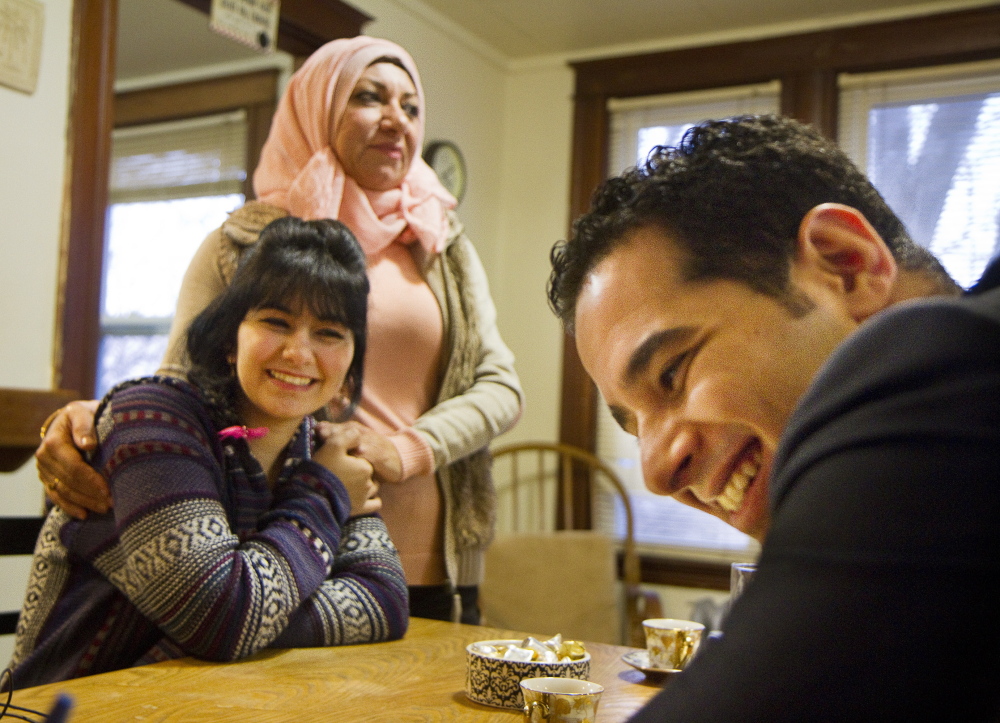Thursday will be a first for Ali Farid and his family – the first time they’ll sit down to Thanksgiving dinner together. And like a lot of other families in Maine, they’ll count their blessings. At the top of their gratitude list? Safety.
They no longer scan the horizon for snipers every time they drive down the street. Unlike when they lived in Iraq, they no longer have to worry about bombs and bullets and friends disappearing in the night.
Here in Maine – in their small, comfortable apartment in Westbrook – they are safe. For them, that’s everything.
“That’s as basic as it gets,” Farid says. “That’s the essential element we were missing in our lives.”
Farid, 26, was a combat interpreter for U.S. troops in Iraq. When the troops withdrew, he knew his days in his homeland were numbered.
It also became increasingly dangerous for his family – his father and mother, two younger brothers and younger sister.
“My family had to move around from one place to another just to avoid being detected by insurgents.”
Farid was able to leave Iraq on a special immigrant visa because of his work with the U.S. government. He arrived in Maine three years ago.
“It was October 12, 2011,” Farid says. “I still remember the day.”
And he still remembers the difficulty of letting go of the fear and hypervigilance that had been part of his life for so long.
“I remember every detail of my first night in my apartment and somebody knocking on my door. I don’t know if it’s somebody that’s going to kill me. I had all these flashbacks.”
Last year most of Farid’s family was finally able to join him in Maine. One brother, a police officer, is still waiting for approval to come to the United States.
They are among 190 individuals from Iraq who resettled in Maine in 2013, says Tarlan Ahmadov, the program manager of refugee and immigration services for Catholic Charities of Maine. The majority came here because they already had family in Maine. Others, who have no ties to the United States, are allocated by the State Department. For most, the reality of being safe is worth all of the challenges of adjusting to a new country, culture and climate.
“I think they’re all thankful,” Ahmadov says, “for the opportunity to re-establish their lives.”
Farid’s father is an electrical engineer, and his mother has a master’s degree in anthropology. Both are taking English lessons in the hope of soon finding jobs.
His brother Nizar, 24, who owned two successful clothing stores in Baghdad, now works at Home Depot.
Starting over isn’t easy, but they didn’t expect it to be.
“That’s the thing about the United States that I’m most sure of,” says Farid, sitting at the dining room table in his family’s second-floor apartment, sipping strong Turkish coffee. “If you put your hard work, if you put your efforts into something, it will turn into something wonderful.”
For him, that something wonderful is law school. He’s now a first-year student at the University of Maine School of Law.
For his 15-year-old sister, Mariam, a freshman at Westbrook High School, it’s knowing that her goal of becoming a psychologist – or maybe a doctor – is within reach.
“Big dreams right now,” Mariam says with a grin. “I’m trying to live the American dream.”
This Thanksgiving the family will prepare the traditional American holiday meal. They’ll have turkey and stuffing, potatoes and pumpkin pie, thanks to a gift basket of food from the Knights of Columbus.
But Farid’s mother, Dunya Al Obaidi, will add some of her special dishes, including biryani rice with walnuts, sliced egg and lots of spices.
“You can’t beat my mom’s food,” Farid says with a smile.
Or his father’s words of wisdom.
“My father always tells us, ‘Your country is not the place you were born; it’s the place that welcomes you.’ “
Send questions/comments to the editors.


